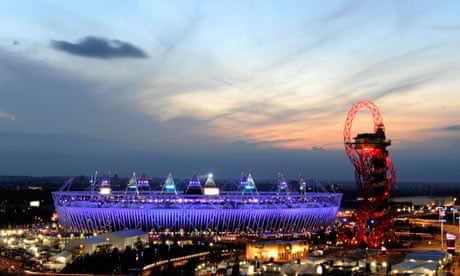It was the key pledge supporting London's bid to host the Olympics, made winningly by Lord Coe and the then-prime minister Tony Blair: that a British Games would "inspire a generation" to become more involved in sport. A nation still heady with the glories it has witnessed now expects greater sporting opportunities as a legacy of the Games and their £9.3bn cost, but the Olympic torch has not burned away the stubborn realities dragging people the other way. Modern life for most besides those few full-time athletes is increasingly sedentary; Britain's sports facilities are old, tired and seriously underfunded, and being further depleted by swingeing government cuts to local authority budgets.
The slashing of the £162m funding of school sport partnerships imposed by the education secretary, Michael Gove, in 2010, has received most criticism in the context of developing a genuine sporting legacy, but encouraging adults to be more active is a greater challenge. Critics say in the seven years since the Games were awarded to London, no sufficiently coherent plan, backed by will and resources, has been developed by the government to capitalise on the post-Olympic rush of enthusiasm. Hugh Robertson, the sports minister, while pointing to the £1bn which Sport England, the grant-giving agency, has to invest over four years from 2013-17, acknowledges that driving up participation is "very difficult," and a major advance is unlikely to come quickly.
"I think we will see an improvement," he said. "The Olympics have been marvellous, and generated huge interest. But none of the things that made this difficult have been lessened. We are talking about societal change. If participation increases, it is likely to be on a long-term, incremental basis."
Some say the prospect of even gradual improvement is being damaged by the government's cuts to local authorities, which own and run public sports facilities, but have no statutory duty to do so. In Sheffield, home of gold medal-winning heptathlete and "face of the Olympics" Jessica Ennis, the council is seeking a 20% reduction in its swimming pool, leisure centre and facilities budget, including that of the Don Valley Stadium, where Ennis trains, as it wrestles with a reduction to its government grant of at least £170m over three years. The council has already "drastically reduced" its maintenance of parks, including playing fields, according to its leader, Julie Dore.
"The chance of an Olympic legacy is being undermined," she said, "and the situation is only going to get worse. We believe in all the benefits of sport, and do not want to close any facilities, but when we are forced to cut on this scale, our statutory responsibilities mean that sport, leisure and parks become an easy target."
Councils are being forced to implement cuts of £6.25bn, 28% of their grants from the government, between 2010-11 and 2014-15, according to the Local Government Association. Playing fields, sports centres and swimming pools, and the staff to run them, are under threat and many budgets are being cut. The LGA warned earlier this year that by 2020 funding of discretionary services, including sport, faces a 66% reduction, and could disappear, due to the mounting cost of adult social care, which councils must provide. A survey of councils by the Chief Cultural and Leisure Officers Association (CLOA) earlier this year found that services, including arts and culture as well as sport, are suffering reductions of around 10% on average, with further cuts to come. So far, the CLOA estimated, 2,800 jobs have been lost in the sector.
"The sheer scale of ongoing cuts to local government funding represents the biggest single threat to a participation legacy for London 2012," said Andy Burnham, the shadow health minister.
The £1bn government and lottery funding of Sport England is the prime national vehicle now for encouraging participation, distributed to the governing sports bodies, which have targets to meet. A central aspect of the strategy is to link local sports clubs with schools, which often have an area's best facilities, and to staunch the huge drop in people taking part in sport after they leave education.
Jennie Price, Sport England's chief executive, is optimistic for a post-Olympics increase in participation, but acknowledged many governing bodies, whose role has traditionally been focused on running clubs and competitions, were not equipped for the new development drive. She cited hockey, netball and cycling as examples. "We have a reasonable chance," Price said. "Around half the governing bodies have a good understanding of what motivates participation and are evolving different models of their sports to make them attractive."
The challenge of helping people to be more active has grown into a major public health issue, although there remains limited co-operation across government departments responsible for different aspects of the problem. Sport England's survey in April 2012 found 15.3m people, 35.7% of the population, participated in at least 30 minutes of moderately intensive sport once a week, the recommended minimum. Department of Health guidelines for people to be active, which include brisk walking for at least half an hour five times a week, is met by only 37% of British adults, according to research published last month in the medical journal, the Lancet.
So, the nation still hugging itself with pride at the prowess of Team GB athletes has 64% of its adults not playing sport once a week, and 63% not even walking often enough to be physically healthy.
The mental and physical health consequences of inactivity are the subject of persistent official warnings; the latest NHS health survey for England found that in 2010 68% of adults were obese or overweight, a growing tendency in recent times, and 16% of children were obese. The economic cost of obesity is estimated at £50bn a year by 2050, £9.7bn to the NHS.
Yet despite the warnings, progress towards increasing participation has been slow, and several ambitious targets have been abandoned. Sport England's figures show there was a jump of almost 1m in 2007-08, but since then, only around 400,000 more people have been drawn into playing sport.
Given the stubborn factors pulling people to inactivity, it was always controversial for Coe and Blair to claim that hosting the Olympics would inspire a generation to do more. Surprising as it sounds, while inspirational feats still feature vividly in the national mind, no previous Games has led to a general increase. Blair made the claim even though his Downing St strategy unit had stated in a 2002 report, Game Plan, that the links are tenuous between watching top athletes perform and being motivated to do sport.
"There is little evidence that hosting events has a significant influence on participation," Game Plan concluded. It advised that hosting events such as the Olympics would produce surging national pride, but for a huge cost: "It would seem that hosting events is not an effective, value for money method of achieving a sustained increase in mass participation."
Nevertheless, three years later, Blair pledged to the International Olympic Committee in Singapore that a London Games would do exactly that. Coe later admitted the claim was not supported by research or a strategy for how participation would be increased. Then the £2.4bn budget presented by Coe's bid team, supported by the government, rocketed to £9.3bn, a golden pot of public money which was protected even as government funding was slashed around it.
That huge expense, vindicated by the sparkling and brilliantly-organised success of the Games, dwarfs the money available to build and maintain sports facilities, and run sport development programmes, across the country. Chris Gratton, professor of sport economics at Sheffield Hallam University, explains that Britain's limited public sporting stock dates from two phases: late Victorian and early 20th century philanthropy when swimming pools were built, then leisure centres, the fruits of sudden local authority financial surpluses, in the 1970s. "Our commercial facilities, such as private gyms, are relatively good," Gratton said, "but since the 1970s, comparatively few public facilities have been built."
Under the previous Conservative government, cuts to local authority budgets saw many facilities decline, and thousands of playing fields sold off. A review for Blair's government by Baron Carter of Coles in March 2005 found that rebuilding sports facilities to modern standards would cost around £4.5bn. Yet no major rebuilding programme has taken place, and just over twice that figure was spent building the Olympic facilities.
Gratton said all research into sports participation shows poverty and inequality lead to people being less active. Finland, which has Europe's highest rates of sports participation, thanks to a strong public health message and making facilities available locally, is a more equal society than Britain. "Poorer people suffer social exclusion," Gratton said, "which, by definition, applies to exclusion from sport, too."
Robertson agrees, and accepts the cuts to councils will not help. "I do recognise that poverty and inequality affect participation," he said. "And it would be dishonest not to recognise that local authorities cutting budgets will have an impact."
He pointed in compensation to changes in lottery distributions which he championed, increasing the proportion of the lottery total going to sport from 13.7%, to 20%, enabling Sport England's £1bn four-year funding. He identified too a specific Olympic legacy programme, Places People Play, targeted at making small grants to facilities in poorer areas – the initiative's budget is £135m over three years.
Robertson said that while the Games were a huge success, and had given sport "a tremendous boost," the afterglow is unlikely to translate into a great upsurge in participation.
"We have held an Olympics which surpassed expectations; it has produced an amazing stimulus, and a new generation of sporting heroes. However anybody who remotely pretends it will be easy to increase general participation in sport is kidding themselves."
So, the claim that a London Games would inspire a generation to do more sport, is in danger of being an over-promise. After the euphoria, the battle is against sedentary culture, junk food, haggard sports facilities, too few opportunities, local authority cuts, and, for young people, inequality between private and state schools. If this landscape undergoes no post-Olympic transformation, Britons who supported the Games so wholeheartedly may come to feel short-changed by its legacy.

